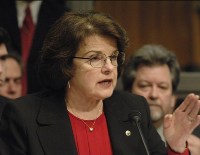Deputy Director
Senator Feinstein Cites CCST Report in Support of Innovation Legislation
April 26, 2007 | CCST Newsroom | Contact: M. Daniel DeCillis

Senator Dianne Feinstein cited CCST’s Critical Path Analysis of California’s Science and Mathematics Teacher Preparation System yesterday in a statement of support for a bipartisan measure to strengthen federal investments in educational opportunities for math, science, engineering and technology.
“America’s economy is fueled by innovation, and innovation is enabled by a strong foundation in math and science. Our country’s math and science foundation is eroding, and our innovative strength is similarly weakening,” Senator Feinstein said. “This bill would strengthen educational opportunities in math, science, engineering, and technology from elementary through graduate school, increase the federal investment in basic research, and develop an innovation infrastructure – all which is greatly needed in an increasingly competitive global economy.” Feinstein cited the shortage of science and math teachers in California documented in the CCST report as a reason why she supported the new legislation.
“Strengthening the teaching of math and science is crucial if California is to maintain its competitive edge and economic growth…it is imperative that we take steps to ensure that our children, as our future leaders, are fully prepared with the skills to take on the demands of the country’s changing economy and workplace.”
-Senator Dianne Feinstein
The America Creating Opportunities to Meaningfully Promote Excellence in Technology, Education and Science (COMPETES) Act (S. 761) was introduced by Senate Majority Leader Harry Reid and is cosponsored by 57 senators. It reflects recommendations by the National Academies’ report Rising Above the Gathering Storm and the Council on Competitiveness’ Innovate America report. Both of these reports conclude that action is needed now in order to secure the nation’s economic and technological leadership in the future.
The bill contains many of the provisions developed for the National Competitiveness Investment Act (S 3936) proposed in 2006. That bill did not pass before the end of the last Congressional session. CCST, in a letter to House Speaker Nancy Pelosi and the California congressional delegation earlier this year, urged Congress to take up the important issues addressed in the NCIA.
“We are pleased to see Congress once again considering actions of a suitable scale to have a measurable impact on the nation’s science, education, and innovation infrastructure needs,” said CCST Executive Director Susan Hackwood.
“[CCST’s] report concludes that strengthening the teaching of math and science is crucial if California is to maintain its competitive edge and economic growth,” said Feinstein. “That is why it is imperative that we take steps to ensure that our children, as our future leaders, are fully prepared with the skills to take on the demands of the country’s changing economy and workplace.”
Key provisions of S. 761 (COMPETES Act)
|




